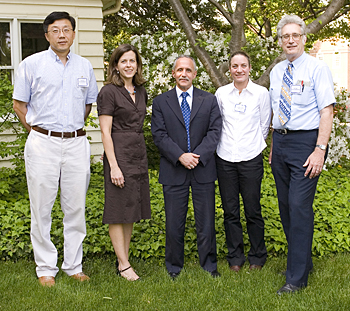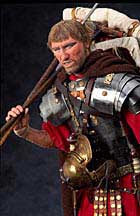
Annette Giesecke (second from the right), associate professor of foreign languages and literatures at the University of Delaware, received the institution's Outstanding Teaching Award May 24, 2007. The award is based on student and peer evaluations, alumni testimonials, the number and range of courses offered, involvement in individual instruction, quality of advisement and mentoring, demonstrated commitment to student welfare and development and an acknowledged reputation in teaching.
Giesecke is a professor in UD's classics program, teaching courses in ancient Greek and Latin as well as Greek and Roman literature and civilization in translation. She chaired Ancient Greek and Roman Studies and currently serves as director of Undergraduate Studies.
Her research interests are Latin and Greek poetry, Greek and Roman art and architecture and Utopianism in ancient Greece and Rome. She is the author of The Epic City: Utopia and the Garden in Ancient Greece and Rome and Atoms, Ataraxy and Allusion: Cross-Generic Imitation of the De Rerum Natura in Early Augustan Poetry.
Giesecke received her bachelor's degree in classics at the University of California at Los Angeles and her doctorate at Harvard University. She taught at Victoria University in New Zealand for four years and then taught at both UCLA and Loyola Marymount University before coming to UD in 1998.
At the ceremony on Honors Day, May 4, Giesecke was cited for her “deep passion for her subject [that] is inspiring to her students and colleagues.”
"
| I am delighted to be part of the University of Delaware's dynamic Department of Foreign Languages and Literatures, and I feel that in joining the UD faculty, I have somehow come full circle. Allow me to explain. I am a native of Los Angeles and received my Bachelor's Degree in Classics at UCLA. A degree in Classics was not at all what I had visualized when I enrolled in college, because I intended to pursue a career in genetic engineering. Thanks to my high school ancient history teacher, whose enthralling narratives of the exploits of Alexander the Great kept me quite literally on the edge of my seat, and to my father, who can still recite from memory the proem of Homer's Odyssey which he had learned as a child, I decided to take Ancient Greek just for fun. Once I read the Iliad and the fabulous tales of Herodotus in the original, I was hooked. Upon completing my undergraduate work, I was fortunate enough to be offered a full scholarship to pursue graduate studies in Classical Philology at Harvard. It was in graduate school that I first experienced the seasons, the culture, and the profound sense of history which distinguish the East Coast. |
| In order to explore the possibility of a career in the museum world, I returned to Los Angeles as a curatorial intern in the Department of Antiquities at the J. Paul Getty Museum before writing my dissertation. In the course of my internship, I decided to focus on language and literature and began working on one of my favorite authors, the Roman poet Lucretius, whose powerful verses remain our most complete exposition of Epicurean philosophy. After completing my dissertation on the profound influence of Lucretius on the poetry and ideology of Virgil and Horace, I accepted a position as assistant professor of Classics at Victoria University in Wellington, New Zealand. There I taught courses ranging from Aeschylus' Agamemnon in Greek to Etruscan and Roman Art and Architecture. I also fell deeply in love with the rich Maori culture and the stunning scenery which make New Zealand a truly enchanted place. Four years later I returned to UCLA, this time on the opposite side of the podium. While I was dividing my time between teaching at UCLA and Loyola Marymount University, I was offered my present position at the University of Delaware and a chance to return to the East, now in a teaching capacity. |
| My interests have always been diverse, and as the field of Classics encompasses such a wide range of disciplines (history, philosophy, rhetoric, prose and poetry of all varieties, art, and archaeology included) it is the ideal field for me with respect to both research and teaching. My research interests are Latin poetry, particularly the epic poetry of Lucretius and Virgil; Greek tragedy; the Homeric epics; the relation between texts and images; and ancient painting. It is, however, Lucretius and his keen observation of phenomena in the natural world, the fervor of his essentially utopian vision, and the magnitude of his influence which remain the focus of my work. Strangely, Lucretius has never been regarded as a utopian author, and in applying the increasingly popular theories of utopics to the analysis of his verses, my aim is to demonstrate just how timely and relevant Classical antiquity remains. |
| As a teacher, I am a strong believer in the holistic approach to Classical antiquity. That is, I attempt to give students the broadest possible vision of the Greek and Roman world in literature, language, and myth courses alike by mingling historical material with ample illustrations of material culture as expressed in the arts, architecture, and other physical remains. Above all, my desire is to ensure that the study of Classics-the very roots of the Western heritage-remains alive and to demonstrate the versatility and usefulness of Classics as a major. Students who have had a Classical education are increasingly sought after by professional schools and businesses because they demonstrate the ability to write and reason, and this makes it especially exciting for me to be an integral part of the University's Classics program. " |
Publications:
 The Epic City: Urbanism, Utopia, and the Garden in Ancient Greece and Rome (Hellenic Studies Series)
The Epic City: Urbanism, Utopia, and the Garden in Ancient Greece and Rome (Hellenic Studies Series)
"As Greek and Trojan forces battled in the shadow of Troy's wall, Hephaistos created a wondrous, ornately decorated shield for Achilles. At the Shield's center lay two walled cities, one at war and one at peace, surrounded by fields and pasturelands. Viewed as Homer's blueprint for an ideal, or utopian, social order, the Shield reveals that restraining and taming Nature would be fundamental to the Hellenic urban quest. It is this ideal that Classical Athens, with her utilitarian view of Nature, exemplified. In a city lacking pleasure gardens, it was particularly worthy of note when Epicurus created his garden oasis within the dense urban fabric. The disastrous results of extreme anthropocentrism would promote an essentially nostalgic desire to break down artificial barriers between humanity and Nature. This new ideal, vividly expressed through the domestication of Nature in villas and gardens and also through primitivist and Epicurean tendencies in Latin literature, informed the urban endeavors of Rome."
Journal for the Society for Utopian Studies:
Giesecke, Annette Lucia, Beyond the Garden of Epicurus: The Utopics of the Ideal Roman Villa 12.2 (2001): 13-32.
Giesecke, Annette Lucia, Lucretius and Virgil's Pastoral Dream 10.2 (1999): 1-15.
Office: 111 Jastak-Burgess Hall
Phone: 831-0545
E-mail: alg@udel.edu




